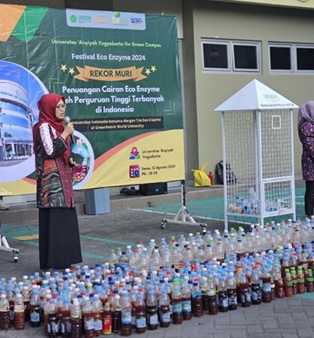Aplikasi Eco-enzym untuk Pemurnian Air Terkontaminasi dan Budidaya Tanaman Obat Keluarga Application of Eco-enzymes for Purification of Contaminated Water and Cultivation of Family Medicinal Plants
Main Article Content
Abstract
Increased water pollution due to industrial, household, and agricultural waste has triggered the need for environmentally friendly technologies for water purification. Eco-enzyme, a solution fermented from various kinds of fruit and vegetable kitchen waste with the addition of sugar and water is recognized to have anti-bacterial and anti-fungal properties effective in decomposing toxic substances and improving water quality. Utilization of waste enzymes is emerging as a viable strategy to treat contaminated water as well as organic fertilizer in the cultivation of family medicinal plants. This training activity on eco-enzyme making and pouring was carried out in the framework of community service activities and the 2024 eco-enzyme festival. Training on making eco-enzymes was carried out using socialization and demonstration methods. Then the finished eco-enzymes were poured into the river behind the campus of 'Aisyiyah University Yogyakarta and watered in the cultivation of Family Medicinal Plants in Sidoagung village, Godean sub-district, Sleman. Based on the evaluation of the activity, participants were very enthusiastic about understanding new knowledge and were able to practice the results of making eco-enzymes. In addition to creating a clean environment, pouring eco-enzymes into the river reduces the contamination of pollutants. In addition, the application of eco-enzymes to the cultivation of family medicinal plants can function as a liquid organic fertilizer that fertilizes the soil and optimizes plant growth.
Downloads
Article Details

This work is licensed under a Creative Commons Attribution-ShareAlike 4.0 International License.
Authors who publish with this journal agree to the following terms:
- Any article on the copyright is retained by the author(s).
- Author grant the journal, right of first publication with the work simultaneously licensed under a Creative Commons Attribution License that allows others to share work with acknowledgment of the work authors and initial publications in this journal.
- Authors are able to enter into a separate, additional contractual arrangements for non-exclusive distribution of published articles of work (eg, post-institutional repository) or publish it in a book, with acknowledgment of its initial publication in this journal.
- Authors are permitted and encouraged to post their work online (e.g., in institutional repositories or on their websites) prior to and during the submission process, as can lead to productive exchanges, as well as earlier and greater citation of published work.
- The article and any associated published material is distributed under the Creative Commons Attribution-ShareAlike 4.0 International License
References
Abdirahman, RZ., Aini, N., Ghofur, A., Wulandari, WD., Lestari, FK., Putri, DT. 2023. Studi pemanfaatan sampah organik untuk perkembangbiakan maggot di tempat pengolahan sampah terpadu (TPST) desa Trosobo. Nusantara community empowerment review. 1(1). pp.1-6. https://doi.org/10.55732/ncer.v1i1.755
Amir 2024. Kerajinan tas dari lastik sebagai Upaya pemanfaatan sampah plastik jiregen bernilai jual. Adma: jurnal pengabdian dan pemberdayaan Masyarakat. 5(1). pp.190-198. https://doi.org/10.30812/adma.v5i1.4014
Benny, N., Shams, R., Dash, KK., Pandey, VK., Bashir, O. 2023. Recent trends in utilization of citrus fruits in production of eco-enzyme. Journal of agriculture and food research. 13, No.2023. pp.100657. https://doi.org/10.1016/j.jafr.2023.100657
Chaerul, M., Zatadini, SU. 2020. Perilaku membuang sampah makanan dan pengelolaan sampah makanan di berbagai negara: review. Jurnal Ilmu Lingkungan. 18(3). https://doi.org/10.14710/jil.18.3.455-466
Dhiman, S. 2017. Eco-Enzyme-A Perfect House-Hold Organic Cleanser. International Journal of Engineering Technology, Management and Applied Sciences. 5,(11), pp. 19-23. http://dx.doi.org/10.37256/amtt.212021726
Hasanah, Y., Mawarni, L., Hanum, H. 2020. Eco enzyme and its benefits for organic rice production and disinfectant. Journal of Saintech Transfer. Vol. III, No. 2. Pp. 119-128. https://doi.org/10.32734/jst.v3i2.4519
Henry (2022) Indonesia Termasuk Penghasil Sampah Makanan Terbesar di Dunia, Kemenparekraf Gandeng Jaringan Hotel dan Surplus, Liputan6. Available at: https://www.liputan6.com/lifestyle/read/5049102/indonesia-termasuk-penghasil-sampah-makanan-terbesar-di-dunia-kemenparekraf-gandeng-jaringan-hotel-dan-surplus (Accessed: 1 September 2022).
Janarthanan, M., Mani, K., Raja, SRS. 2020. Purification of contaminated water using eco-enzyme. IOP Conference Series: Materials Science and Engineering. 955, No.2020. pp.012098. https://doi.org/10.1088/1757-899X/955/1/012098
Kariymah, AN, Abidin, M.R. 2020. Perancangan Media Kampanye Diet Planet sebagai Upaya Pengurangan Sampah Makanan. Jurnal Barik. 1(2). https://doi.org/10.26740/jdkv.v1i2.35990
Permatananda, PANK., Pandit, IGS., Cahyawati, PN., Aryastuti, AASA. 2023. Antimicrobial properties of eco-enzyme: a literature review. Bioscientia Medica: Journal of biomedicine & translational research. https://doi.org/10.37275/bsm.v7i6.831
Probowati, W., Nugraheni, IA., Suryadi. 2020. Pembentukan komunitas Masyarakat pembuat media tanam dari sampah plastik kresek. PengabdianMu: Jurnal ilmiah pengabdian Masyarakat. 5(3). pp.154-161. https://doi.org/10.33084/pengabdianmu.v5i2.1067
Rasit, N., Fern, L.H. , Karim Ghani, W.A.W. 2019. Production and Characterization of Eco Enzyme Produced from Tomato and Orange Wastes and Its Influence on the Aquaculture Sludge. International Journal of Civil Engineering and Technology, 10(3), pp. 967-980. https://papers.ssrn.com/sol3/papers.cfm?abstract_id=3456453
Salvi, S., Sabale, R., Bobade, S., Dhawale, A. 2024. Inovative use of eco-enzymes for domestic wastewater purification. Journal of environmental nanotechnology. 13(3). pp.435-439. https://doi.org/10.13074/jent.2024.09.242771
Wahyuningsih, S., Wafa, LA., Zaskia, M., Fadhilah, ZR., Amalia, R., Althaf, ZND. 2024. Pengolahan limbah plastik menjadi ecobrick sebagai Upaya kolaborasi mahasiswa KKN UIN Walisongo dengan SDN 2 Rowosari dalam membangun taman ecobrick. Pandawa: Pusat Publikasi Hasil Pengabdian Masyarakat. 2(4). pp.60-67. https://doi.org/10.61132/pandawa.v2i4.1251
Wijaya, DP., Laila, N. 2024. Potential for eco-enzyme development as entrepreneurship in river ecotourism and mangrove conservation. Indonesian tourism journal. 1(2). pp.131-145. https://doi.org/10.69812/itj.v1i2.39
